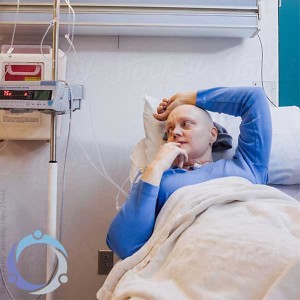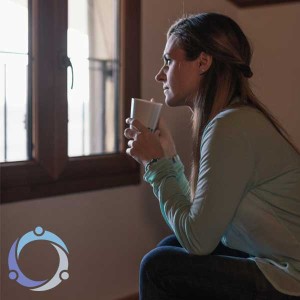
If your loved one or close friend is living with breast cancer, chances are you are feeling more emotions than you can even express. Breast cancer care is full of treatment options, medications, and an entirely different language than what you are used to. You might be feeling overwhelmed, scared, anxious, or confused, and all rightfully so. Whether your friend was just diagnosed or been fighting for some time, we are here to join your team by giving you some tips on how to become the best caregiver possible and support her breast cancer care.
We love caregivers. In fact, our whole company is built to support the caregiver. Let us educate and empower you so that you can focus your energy and attention on the patient – your friend, your family member. The team here at Lotsa Helping Hands has taken time to talk to breast cancer survivors and their caregivers who stood by during chemo treatments and surgeries, during nausea and other side effects. These survivors and their caregivers have given us some topics they wish they knew more about at the start of their journey with breast cancer.
We cover how to support the patient, how to be encouraging, how to prepare for surgery to combating chemo side effects and try fill in the gaps of any remaining breast cancer care questions. We will also give you a glimpse into how you can rally the troops to give emotional support to your friend who is doing battle. One thing is certain – breast cancer is not easily fought alone. The more friends and family to support the patient and bear the load of everyday tasks, the better.
Having a friend or family member with breast cancer was probably not in your life plan. But, it is where you are right now. Take time to educate yourself about breast cancer care so that you can give your friend the support and encouragement she’ll need to fight. We are here with you every step of the way so that you can provide the best possible breast cancer care to your loved one.
What Breast Cancer Support Looks Like
 Offering breast cancer support to your friend or family member can be difficult at times. You might not know what to do to help, or the patient might not have the energy to figure out what she needs help with in the first place. Meanwhile, other friends and family might be asking the same questions. Even with the best of intentions, too many helpers with not enough direction can make the patient feel overwhelmed or lead to disorganization. There is nothing worse than disorganized breast cancer support – no patient needs 4 pans of lasagna dropped off on one day, with nothing else coming for the next two weeks.
Offering breast cancer support to your friend or family member can be difficult at times. You might not know what to do to help, or the patient might not have the energy to figure out what she needs help with in the first place. Meanwhile, other friends and family might be asking the same questions. Even with the best of intentions, too many helpers with not enough direction can make the patient feel overwhelmed or lead to disorganization. There is nothing worse than disorganized breast cancer support – no patient needs 4 pans of lasagna dropped off on one day, with nothing else coming for the next two weeks.
So, how can you find out what tasks are most needed and wanted by the patient? You ask! The patient might not even know what they want or need quite yet, so your first step as a caregiver is to come prepared with a list of ideas or questions for the patient so you can understand what she needs most. Here’s a list of questions that you could ask to start down the best path of breast cancer support and make your friend’s life a bit easier during this time.
Caregiver Tip: Have a calendar and notebook with you when you ask your friend these questions so that you can remember the answer. Make an afternoon of it and bring over pizza or coffee so that it doesn’t feel so formal.
Breast Cancer Support Question List
- Who do you want with you at your chemo appointments?
- Is there anyone (children, parents, etc.) that you do NOT want to sit with you at chemo?
- Do you prefer only one person to sit with you at appointments, or could a few come?
- Are you feeling up to driving yourself to appointments, or would you prefer help?
- How long are your chemo appointments scheduled to last?
- Who do you want to know about your breast cancer care?
- Do you want someone to take notes during your doctor appointments?
- Is it okay if your companion asks questions at your doctor appointments and treatments, or do you prefer to be the only one asking?
- Do you feel like cooking, or can we set up a meal drop off?
- What time does your family prefer to eat dinner?
- Do you have any food allergies or aversions due to medications?
- Can we make breakfast items for you? What about freezer meals?
- Can we help with dropping off the kids at school or activities? What is that schedule?
- How can we help out with your pets?
- Are you open to having help with cleaning?
- How else can we serve you during this time?
These are just a few questions to get the patient thinking about how she might need help during the upcoming months. This is a huge list, so there’s no need to ask all of the questions all at once. Instead, use it as a guide when thinking about what support she might need.
Forming Your Core Support Group
Now that you have the information from the patient, what do you do with it? Disseminate the information and rally the troops. It is assumed that since you were asking the questions and finding out the information, that you will be the one to relay the information back to your patient’s breast cancer support group. No, we aren’t talking about the breast cancer support group at the hospital or clinic. Instead, we are speaking about the patient’s personal breast cancer support group – a small group made up of trusted friends and family members who are the core encouragers and supporters.
This core group will ultimately be responsible for passing along information to well-wishers and question-askers, as well as being the gatekeepers for the patient’s home. This group will be the ones who see your patient at her worst, but also prevent the well-intentioned neighbor from visiting when the patient has been puking all day long. These are the warriors and cheerleaders.
When forming this special breast cancer support group, be sure that the patient is involved in picking and choosing who will be involved. You want to pick close friends and family members who will keep medical information close and not gossip. Stay away from drama seekers and friends who tend to flake out on major responsibilities. Look for friends and family who are optimistic, caring, empathetic, and loving; and remember, there might be the perfect person in your outer circle of friends who might be able to help out with the planning and organization so keep your options open. Keep your core group in the know by building a community right here at Lotsa Helping Hands.
Life After Breast Cancer Diagnosis
It’s here, the breast cancer diagnosis. If you were in the room with your friend when the doctor told her the news, neither one of you probably heard very much after the words “you have breast cancer.” The whole world slows down and the bottom drops out of the floor as your brain struggles to process it. But here you are, the caregiver and friend of someone who has breast cancer. As you both begin to process this new breast cancer diagnosis, let’s talk about a few things that you shouldn’t say to your friend.
Caregiver Tip: This is a great list to pass out to her friends and family.
What NOT to Say After a Breast Cancer Diagnosis
- I had a friend with breast cancer and “she died,” “lived,” “is fine,” “is depressed,” etc.
When first diagnosed, it isn’t too helpful to hear all about the friends of your friends who have had a breast cancer diagnosis. Not only does breast cancer affect patients differently, it is difficult to compare your journey with that of someone who you don’t even know. Besides, it is not encouraging to hear about how the friend of your great aunt Ethel died only weeks after receiving her breast cancer diagnosis.
- What kind of chemo will you have? Will you have radiation? What other medications will you be taking? What is your plan of care? Will you lose your hair?
Go easy on all of the technical questions and inquiries about the plan going forward after your friend first receives her breast cancer diagnosis. She is still processing the news and her doctor might not have given her a treatment plan during the diagnosis talk. She likely has the same questions as you do, and plenty more. So, be conscious about giving her a break on the incessant questions.
- Oh thank goodness it’s breast cancer – you can just remove those.
Even if a mastectomy is in the plan of care, it is not a decision that your friend will make lightly. Removing a part of her body – a part that makes her feel like a woman – is a tough decision. There’s nothing “just remove those” about it.
- What is your survival rate?
Yikes. Can we just all make a promise to one another that we will not ask the odds of survival are? Sure, this is a valid concern but one that will only cause sadness and confusion right now.
What to Ask the Doctor
When the breast cancer diagnosis first comes about, you might not know what to ask the doctor first. We recommend taking time after the “diagnosis talk” to decompress. The next step is to make a list of what you and your friend want to know. This way, at the next appointment you have a list of questions to ask the doctor. Write or type out your list and leave plenty of room under each question for you (or a designated person) to write down answers and notes from the appointment. By taking time to ask the doctor about the diagnosis, treatment plan, and other concerns, you are helping your friend take back some control of the situation, advocate for their own care, and become an active member of the treatment team.
Caregiver Tip: Ask you friend whether she wants to be asking the questions or if she wants you to ask the doctor on her behalf.
Here are a few questions to get you started:
Questions to Ask the Doctor
- What type of cancer do I have? What does that mean?
- What stage is my cancer? What does that mean?
- Has my cancer spread to any places outside of my breast? Where to?
- How much experience do you have treating my type of cancer?
- What are my treatment goals?
- What are my treatment options?
- What is the timeline for treatment?
- Should I get a second opinion? How do I go about doing that?
- Is there a glossary of terms related to my breast cancer diagnosis?
- I’m scared/nervous/anxious. Can you recommend a support group or counselor that I can work with?
- What can I do to take control of my health (diet changes/recommendations, etc.) that will complement your treatment?
The diagnosis part of the journey is sometimes the scariest because everything is new and uncharted for you and your friend. However, being prepared with the right questions can help the patient understand their situation and also help you feel involved with the direction of treatment.
Preparing for Breast Cancer Surgery
 Depending on your treatment plan, breast cancer surgery of some sort may be in your future. Any medical procedure can be scary for the patient and the caregiver, but breast cancer surgery is extra nerve-wracking because of the reason the patient is there. Surgery day is another day of remembering, in case you somehow forgot, that she does in fact have cancer. In order for you to actively help in the preparation and aftermath of her breast cancer surgery, we have pulled together a list of things to consider and prepare for.
Depending on your treatment plan, breast cancer surgery of some sort may be in your future. Any medical procedure can be scary for the patient and the caregiver, but breast cancer surgery is extra nerve-wracking because of the reason the patient is there. Surgery day is another day of remembering, in case you somehow forgot, that she does in fact have cancer. In order for you to actively help in the preparation and aftermath of her breast cancer surgery, we have pulled together a list of things to consider and prepare for.
Caregiver Tip: Use these as a starting point for a checklist to be sure that nothing falls through the cracks while preparing for surgery.
Preparing For Surgery: 1-2 Weeks Before
- Be well informed about the upcoming breast cancer surgery. Make sure the patient doesn’t have any lingering unanswered questions and feels like surgery is her best treatment plan right now.
- Schedule any pre-op visits like blood work or other labs. Rally the troops to drive the patient to and from the appointments as necessary.
- Assure that the hospital where the surgery will take place is on the insurance coverage plan.
- Call the insurance company to give them any required pre-surgery information, if needed.
- Coordinate a meal drop-off calendar for the two weeks following the surgery. Prepare freezer meals for any date that isn’t covered by a member of the community.
- Assure that the patient’s children (and/or pets) are taken care of for the day of surgery, as well as for the weeks after surgery.
- Talk with older children about the surgery and what Mom will be like for a few days/weeks after surgery. Let them ask as many questions as they would like.
Preparing For Surgery: The Night Before and Day Of
With the surgery date looming near, the patient might be feeling anxious or scared. Combat some of these feelings by being prepared for the surgery the best you both can, and for knowing what to expect.
- Preparing for surgery requires liquid and food fasting. Follow the instructions for fasting as per your doctor’s office.
- Caregiver Tip: Don’t drink coffee or eat a huge breakfast in front of the fasting patient because that’s just cruel.
- Ask her how she is feeling as she is preparing for surgery, listen to her, and validate those feelings. You can’t fix her if she is scared or worried (which is natural), but you can encourage her and squeeze her hand.
- Stay with her in the prep area as long as they will let you. Stay until they kick you out, because being alone is the hardest part.
- Return to her in the recovery room as soon as they will let you. She will be in a lot of pain or feeling nauseous from her anesthesia, but she will know you are there and that makes it a lot less scary.
- Take lots of notes on post-operative instructions. Ask questions if you need clarification.
- Caregiver Tip: She is going to be in pain and coming off of her anesthesia so getting the post-op instructions lies with you. Tuck a pen and notebook in your purse so that you can write medicine doses and other information down.
- Ask her how her pain is and relay that information to medical staff. Staying ahead of the pain is the best way to assure a calmer recovery.
- Keep the core group updated throughout the day.
- If it is an outpatient surgery, drive her home and set her up comfortably in bed or in the recliner (if she cannot lay flat). Stay with her until someone comes to take your shift. Someone should be in the home at all times for at least a few days.
Packing List for Caregiver
Making sure that you have what you need for the surgery is important and can give you a sense of control over the situation. Pack items especially for you and for the patient. Here are a few ideas to get you started.
- Phone numbers of core support group for sending updates
- Cell phone and charger
- Snacks for your long wait in the waiting room
- A pad of paper and pen so that you can take post-op notes
- A list of questions that you and the patient have prepared together so that you can assure all her questions are answered
- Something to read that will help pass your time a bit faster (even though it is going to drag no matter what you do)
Packing List for Patient
Your loved one will want to have a few items especially for the hospital. Depending on how long her stay will be, you might want to pack more than one of each item.
- Comfortable clothes ( button down shirts or zip-up hoodies that are soft and a size big)
- Hair scarves or headbands
- Glasses case (she can’t wear contacts in surgery)
- A jewelry bag for her wedding ring and other jewelry (she can’t wear them in surgery)
- A cozy and favorite blanket
- Her pillow (for hospital stays overnight)
- Her cell phone and charger
Post Surgery To Do’s
Once your friend is out of surgery, you can step back in to support and encourage her. Whether she is recovering at home or in the hospital, these tips ring true and can help you provide the best support.
- Monitor pain and report any concerns to the doctor
- Drive her to/from medical follow up appointments
- Dispense her medications
- Work hard on getting her to eat and drink. Make/buy/prepare anything that sounds good to her so that she eats.
- Take care of the laundry, housework, and other chores so that she can focus on resting up.
- Ask her how she is feeling, listen to her, and validate that.
- Keep visitors to a minimum unless she requests otherwise.
- Caregiver Tip: Tell her that she is brave.
Remember during this stressful time to take care of her and of yourself. Don’t become unhealthy because you are stressed out. Instead, delegate tasks and be sure that you are getting plenty of time away to recharge as well. Sometimes this is the hardest part, but it is also the most essential. A sick caregiver can’t help anyone.
Coping with Chemotherapy Side Effects
 Treatment for breast cancer often includes radiation, chemotherapy, or a combination of both. Depending on the treatment plan, you might become readily familiar with chemotherapy side effects. We won’t sugar coat it for you – chemotherapy side effects can be intense and difficult to deal with. However, with extra support and encouragement, your loved one will conquer this leg of the journey.
Treatment for breast cancer often includes radiation, chemotherapy, or a combination of both. Depending on the treatment plan, you might become readily familiar with chemotherapy side effects. We won’t sugar coat it for you – chemotherapy side effects can be intense and difficult to deal with. However, with extra support and encouragement, your loved one will conquer this leg of the journey.
Each patient reacts to the various chemotherapy side effects differently. However, you can be ready to tackle sickness by knowing what could happen and how to combat any ill effects. We have prepared a list of the top chemotherapy side effects and a few tips on how to help your friend manage them.
Common Chemotherapy Side Effects
- Nausea
One of the major side effects of chemotherapy is nausea. Symptoms of nausea can vary from patient to patient, with some people losing their appetite and others vomiting throughout the day. Any way it presents itself, nausea can make the patient pretty miserable.
Try managing nausea by selecting foods that sound good to the patient then eating in small bites or sips. If your friend feels sick while eating, encourage them to stop and leave the table. She can always try again another time. Offer foods and drinks in small portions, serving one thing at a time so that it doesn’t seem overwhelming. Try easy to digest snacks like dry crackers and toast, and soothing drinks like peppermint tea or ginger ale.
Caregiver Tip: Try popsicles as they can soothe an upset stomach, provide necessary hydration, and combat any painful mouth sores that sometimes happen with chemo treatments.
Don’t forget to keep an open communication with the doctor at all times. Most doctors will prescribe anti-nausea medications which are successful with many patients. If your friend is still feeling sick, speak up for her at her next appointment. Her doctor might change her dose or her medication entirely to provide some relief.
- Fatigue
Your friend is probably exhausted while going through chemotherapy treatments. Chemo zaps energy levels and keeps her feeling tired throughout most of the day. Fatigue can easily lead to depression or guilt over missing out on important events; this chemotherapy side effect can really beat down her optimism. Don’t let fatigue get the best of your pal by helping her manage it the best that she can.
Encourage your friend to rest by enlisting the help of others to take care of household chores like meal preparation, cleaning, laundry, and paying bills. She is more likely to want to use her limited energy chatting with her children about their school day or talking to her mom on the phone. By taking care of these important everyday household tasks, you are allowing her to spend her time and energy on more important things.
Caregiver Tip: If your friend is a mom and feeling a bit guilty for not having the energy to run around with her kids, prepare a few gifts that encourage quality family time on the couch or in mom’s bed. Include movies, popcorn, coloring books, sticker books, or a new novel for the family to read together.
If your friend does start showing signs of depression, know first that this is normal. Feeling depressed about having cancer and being sick and tired is a natural reaction and response. However, don’t let it go unmanaged. Encourage her to talk with her doctor to explore treatment options as well as support groups that suit her situation.
- Hair loss
Hair might seem temporary – “hey, it can always grow back” – but losing hair during chemotherapy can be a devastating blow and reminder of the battle she is fighting. Support her through her hair loss with a lot of love and encouragement….and scarves.
When your friend is losing hair, encourage her to try a gentle shampoo, like baby shampoo, and air drying in order to go easy on her scalp and reduce breakage. If your friend is craving a blowout, let her know she can blow dry on a low heat setting to treat herself once in a while.
Dealing with a bald head varies with personal style. It’s your job as the caregiver to help your friend find a style that she feels most confident and comfortable with. Maybe it’s a scarf or a baseball hat, maybe it’s a wig or a bandana. Work with her, and the resources in your local area, to find something so she feels as good about herself.
There are other chemotherapy side effects, but fatigue, nausea, and hair loss are the top offenders. Throughout the chemotherapy process, check in with your friend to monitor her health and how she is feeling. Relay this information to the doctor so that everyone is on the same page. Many times, her doctor can prescribe or recommend treatments for side effects ranging from constipation to sore throat. Don’t let your friend suffer needlessly; when in doubt, talk to the doctor.
Sending a little cheer
If you are far away from your friend, or looking to give ideas for how long distance pals can support her, consider making a care package chock full of goodies to encourage her through the chemo process. Our top picks for chemotherapy care package goodies are:
- Candied ginger or ginger lollipops
- Favorite magazines
- A new book
- Soft socks (or silly ones)
- A journal and set of pens
- Photos of your favorite times together
- Cards or Well-Wishes to read during chemo treatments
- A new baseball cap (or scarf, or bandana – whatever she prefers)
- Gift certificate for her favorite local ice cream shop
- A subscription to Netflix or Hulu
Living With Breast Cancer
 Breast cancer is not a short-term battle. Instead, after the diagnosis and the surgeries, after the chemo and the radiation, the patient is still actively engaged in medical support for months and years to come. Living with breast cancer is not for the faint of heart and it can wear on the unsupported patient more than the patient who has a circle of friends and family that love and encourage her. Unfortunately, a patient living with breast cancer can feel forgotten after the shock of the diagnosis and the treatments have slowed down.
Breast cancer is not a short-term battle. Instead, after the diagnosis and the surgeries, after the chemo and the radiation, the patient is still actively engaged in medical support for months and years to come. Living with breast cancer is not for the faint of heart and it can wear on the unsupported patient more than the patient who has a circle of friends and family that love and encourage her. Unfortunately, a patient living with breast cancer can feel forgotten after the shock of the diagnosis and the treatments have slowed down.
In order to keep your friend well loved and cared for throughout her time living with breast cancer, it is important that you ask for help on her behalf when she needs it. Make sure that you keep your Lotsa community informed on her mood and her health. Notify people when she is needing some extra support or when you are needing some extra reinforcements. Communication with the core support team is key so that everyone is getting the help that they need.
Communicate Effectively
Speaking of communication, keeping an honest dialogue with well-wishers is important from the beginning to the end. In order to keep them in line and realistic, try giving them a few helpful tips:
- Your friend will not always feel up to returning calls, emails or texts. Sometimes she only has the energy to read or listen to messages. Living with breast cancer doesn’t always afford the extra energy to return the calls or texts. She loves reading and listening to her messages and is so thankful that you are sending them and lifting her up in your thoughts. Please understand that she might not be able to answer you.
- Speaking of messages, get comfortable with leaving long voicemails. The trek to the phone in the other room seems like miles when you are going through chemo or recovering from a surgery. Chat on the voicemail until it cuts you off – she’ll love hearing all about your day or what is going on in your life.
- She loves all messages – voicemail, text, email, or even a message on the Lotsa community site. Isolation and feeling cut off from the world is part of living with breast cancer – let’s not let our friend feel that way.
- Caregiver Tip: Make it a point to leave her a message of some sort at least once per week. You can even set a calendar reminder on your phone so that not a week goes by that she doesn’t hear from you.
- Know what is extra awesome? Snail mail. You know the kind – old fashioned United States Postal Service mail. Cards, photos, and letters can be read over and over, tucked into purses and hospital bags, and held to remember that she matters and that she is loved. Extra points if you can organize a card shower among your Lotsa community, with people committing to send a card or mailed package on a designated week of the year so that she receives happy mail weekly for a year.
- It’s okay if you feel sad about your friend’s situation. It’s also okay to tell her that. There’s not much worse than everyone around you talking about rainbows and unicorns when you are fighting and living with breast cancer, a serious condition. However, also remember that we are here to support and encourage her, so don’t let her become your personal counselor.
Your friend will feel loved and supported for the long haul when you use your Lotsa community. Don’t set up the community and then let it go by the wayside, especially when it is so important to your patient and her core support team.
Conclusion
Breast cancer is a life changer for the patient and for her support community. Here at Lotsa Helping Hands, we try to provide you with the tools you need to feel educated, encouraged and supported so that you can focus your energy towards getting your girl through this situation.
To best support your friend, set up a Lotsa community today. Once you have your community, you can invite your close friends and family so that they can steer other well-wishers towards Lotsa. Your community page can become the one-stop-shop for health updates, meal requests, child care, and everything in between. Having an active community can keep you free from the hassle of telling different people the same things over and over again.
We think your friend is brave and we think that you are amazing too. We see you putting your friend first, losing sleep at night, and calling in to work so that you can take her to her next chemo appointment. We see you stepping in to support her children and taking her dog for a walk when you don’t even like dogs. We see you squeezing her hand at her hospital bedside and spending time cleaning her bathroom so that she doesn’t have to. We see you, and we think you’re amazing. Carry on, and know that we are beside you cheering you on so that you can pull her through this.



